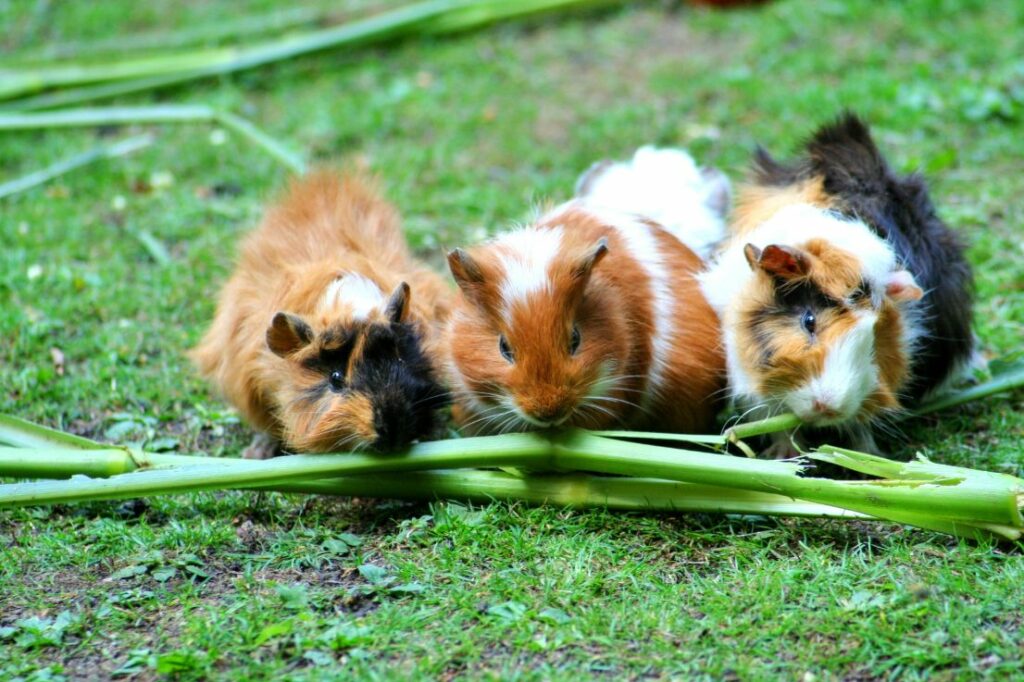Guinea pigs are popular pets known for their cute appearance and affectionate nature. However, like any other animal, they have their own unique behavior patterns. One common behavior that guinea pig owners may encounter is territorial behavior.
Understanding territorial behavior in guinea pigs is essential for pet owners to provide the best care for their pets. This blog post aims to explain what territorial behavior is, its signs, causes, and how to manage it.

What is Territorial Behavior in Guinea Pigs?
Territorial behavior in guinea pigs is their way of marking their territory and protecting their resources from perceived threats. It is common for guinea pigs to display territorial behavior towards other guinea pigs, especially those of the same sex.
Signs of Territorial Behavior in Guinea Pigs
Aggression is the most apparent sign of territorial behavior in guinea pigs. They may show aggression towards other guinea pigs, humans, or even objects. Aggressive behavior may include biting, chasing, and lunging.
Marking is another sign of territorial behavior in guinea pigs. They may use their scent glands to mark their territory. They will rub their chin or flank on surfaces, leaving a scent. They may also urinate or defecate in areas they perceive as their territory.
Vocalization is also a sign of territorial behavior in guinea pigs. They may make different sounds, such as chirping, whistling, or teeth chattering. These sounds may indicate that they are feeling threatened or trying to assert their dominance.
Causes of Territorial Behavior in Guinea Pigs
There are several causes of territorial behavior in guinea pigs. Genetics may play a role in their behavior. Certain breeds may be more prone to territorial behavior than others.
The environment can also influence guinea pig behavior. If they have limited space or resources, they may become more territorial. Additionally, if they have had negative experiences with other guinea pigs, they may be more likely to display territorial behavior.
Hormones also play a role in guinea pig behavior. Male guinea pigs may become more territorial during mating season. Female guinea pigs may become more territorial while pregnant or nursing.
How to Manage Territorial Guinea Pigs
Managing territorial guinea pigs requires patience and understanding. The following tips can help you interact with and bond with your guinea pigs safely:
- Provide Adequate Space: Make sure that your guinea pigs have enough space to move around comfortably. Provide separate areas for food, water, and bedding.
- Introduce Guinea Pigs Slowly: When introducing new guinea pigs, do it gradually. Allow them to sniff each other through a wire barrier first. Then, slowly introduce them in a neutral area.
- Give Them Time to Get Used to Each Other: Allow your guinea pigs time to get used to each other. Supervise their interactions and separate them if necessary.
- Offer Treats: Offer treats to both guinea pigs to encourage positive interactions.
- Provide Toys and Hiding Places: Provide toys and hiding places for your guinea pigs. This will help them feel more secure and reduce their territorial behavior.
When to Seek Professional Help
In some cases, territorial behavior in guinea pigs can become severe. If your guinea pig is displaying severe aggression, it is essential to seek help from a professional. A veterinarian or animal behaviorist can help you manage the behavior and provide appropriate treatment.
Conclusion
Understanding territorial behavior in guinea pigs is essential for pet owners to provide the best care for their pets. By recognizing the signs and causes of territorial behavior, you can manage it and help your guinea pigs feel safe and secure. With patience, understanding, and proper care, you can nurture a happy and healthy guinea pig community.
- How Long Do American Eskimo Dogs Live? Important Factors and Care Tips - September 29, 2023
- Do American Bulldogs Need Grooming? Essential Tips and Care Guidelines - September 29, 2023
- Do Bengal Cats Enjoy Playing? Essential Tips for Keeping Them Active - September 29, 2023